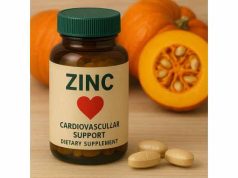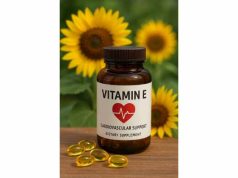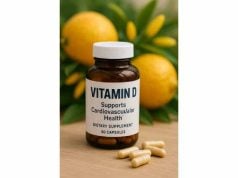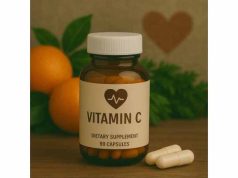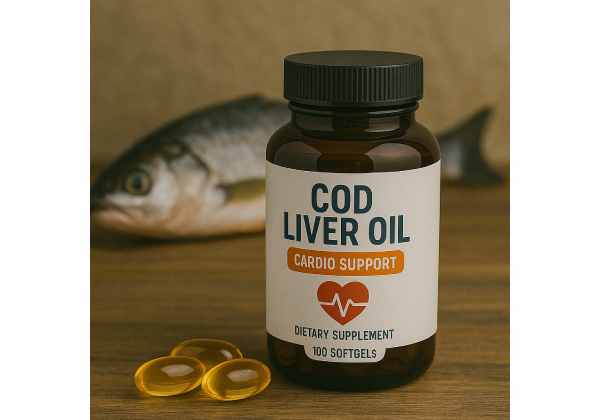
Cod liver oil has long been hailed for its diverse health-promoting properties, thanks to its potent combination of omega-3 fatty acids, vitamins A and D, and other essential nutrients. Emerging research underscores cod liver oil’s invaluable role in safeguarding heart function, helping maintain normal blood pressure, and potentially reducing unhealthy cholesterol levels. For those seeking to bolster cardiovascular strength—whether in the face of inherited risk factors or to prevent future complications—this robust supplement can be an excellent starting point. Keep reading to learn how cod liver oil for heart health may offer comprehensive vascular support and aid in the prevention of cardiovascular disorders.
Table of Contents
- Core Characteristics and Historical Background
- Biological Foundations: How Cod Liver Oil Works
- Research-Based Advantages for the Cardiovascular System
- Recommendations, Dosing Methods, and Safety Concerns
- Frequently Asked Questions: Quick Answers
- References and Sources
Core Characteristics and Historical Background
Cod liver oil is derived from the liver of the Atlantic cod fish (Gadus morhua), a species prolific in the cold waters of the North Atlantic. Though consumed for centuries in coastal regions, this traditional remedy gained broader acceptance in the mid-19th century, especially when physicians started recommending it as a nutritional support for conditions like rickets and general weakness.
Nutritional Profile and Key Compounds
What sets cod liver oil apart from other fish-based oils is its robust vitamin content in addition to omega-3 fatty acids. Some of the essential components include:
- Omega-3 Fatty Acids (EPA and DHA)
- Eicosapentaenoic acid (EPA): Known for its potential anti-inflammatory actions.
- Docosahexaenoic acid (DHA): Crucial for cellular membrane health, especially in the brain and heart.
- Vitamin A
- Acts as a potent antioxidant supporting vision, immune function, and general tissue health.
- Vitamin D
- Vital for bone maintenance, immune regulation, and muscle health. It also helps the body maintain calcium and phosphorus balances, indirectly influencing cardiovascular well-being.
- Additional Nutrients
- While smaller in quantity, cod liver oil may contain trace amounts of other fat-soluble vitamins and beneficial compounds like squalene.
In many ways, cod liver oil can be perceived as a synergy of nutrients that collectively address not just heart health, but also immunity, cognition, and skeletal integrity.
Historical Significance and Modern Resurgence
Historically, populations living in Scandinavia and along the Northern European coast recognized cod liver oil’s invigorating effects. Children especially were given daily spoonfuls to strengthen bones and ward off deficiencies in the absence of abundant sunlight. By the 20th century, cod liver oil had established a foothold in Western medicine, primarily as a prophylactic against rickets (caused by vitamin D deficiency).
Recently, consumer awareness surrounding the importance of heart health has revived interest in cod liver oil. Studies exploring the potential synergy of omega-3s with fat-soluble vitamins have prompted many to incorporate cod liver oil for cardiovascular health as part of a broader wellness routine. Moreover, with nutrient deficiency on the rise due to modern diets, cod liver oil offers a convenient means of bridging essential gaps.
Cod Liver Oil vs. Other Fish Oils
While fish oils extracted from salmon, mackerel, or sardines are rich in omega-3 fatty acids, cod liver oil stands out for its vitamin A and D potency. However, it also typically has lower concentrations of omega-3s compared to standard fish oil capsules. Selecting between cod liver oil and regular fish oil often involves weighing the desire for added vitamins against the need for maximum EPA/DHA content. In some cases, individuals use both, though it’s wise to manage total vitamin A and D intake carefully to avoid potential excesses.
Forms and Processing Methods
Cod liver oil is most commonly available in liquid or softgel capsules. Quality can vary widely based on how the oil is processed. Traditional methods involve steaming cod livers and collecting the oil that rises to the surface, whereas contemporary processing techniques incorporate filtration and deodorization to remove contaminants (like heavy metals) and unpleasant odors.
Cold-Pressed Oil: Typically preserves more vitamins and delicate fatty acids but is more susceptible to rancidity if not stored properly.
Refined Oil: May have extended shelf life or milder taste, but the refining steps can reduce some of its natural nutrient density.
Beyond heart-related perks, cod liver oil is lauded for potentially aiding joint function, emotional well-being (especially in seasonal climates with limited sunlight), and immune health. Since each user’s needs vary, focusing on the product’s purity, freshness, and manufacturing standards is crucial when selecting a brand.
In summary, cod liver oil’s historical usage, combined with modern science, underscores its standing as a potent supplement with a unique blend of omega-3s and vitamins A and D. Its centuries-old reputation for fortifying resilience, especially in harsh coastal conditions, extends to contemporary concerns like maintaining optimal cardiovascular function, reflecting the broad scope of its appeal.
Biological Foundations: How Cod Liver Oil Works
While cod liver oil is best known for its vitamin A and D content, a deeper look reveals the intricate interplay between nutrients that drive its cardiovascular benefits. From anti-inflammatory properties to improved lipid balance, the synergy of omega-3 fatty acids and vitamins is what makes this supplement a powerful resource for heart health.
Role of EPA and DHA in Heart Physiology
Two critical long-chain omega-3 fatty acids—EPA (eicosapentaenoic acid) and DHA (docosahexaenoic acid)—feature prominently in cod liver oil. These fatty acids perform a multitude of tasks that tie directly into cardiovascular well-being:
- Anti-Inflammatory Action
- EPA and DHA can reduce the synthesis of pro-inflammatory molecules, known as eicosanoids, that contribute to vascular damage over time.
- By tempering inflammation, they help maintain arterial elasticity, an important factor in healthy blood pressure regulation.
- Membrane Fluidity
- Cell membranes containing higher concentrations of omega-3 fatty acids exhibit enhanced fluidity and receptor function.
- For heart muscle cells (cardiomyocytes), improved membrane dynamics can stabilize electrical impulses, potentially warding off arrhythmias.
- Triglyceride Management
- High triglyceride levels can lead to a build-up of fatty deposits in arteries. Omega-3s like EPA and DHA often help reduce triglycerides by improving how the body metabolizes fats.
Taken together, these capabilities make cod liver oil an appealing natural measure for individuals looking to reinforce their cardiovascular system from multiple angles.
Impact of Vitamin D on the Heart and Blood Vessels
Vitamin D, abundantly found in cod liver oil, is traditionally lauded for bone health. However, growing evidence suggests it also influences cardiovascular dynamics:
- Endothelial Function: Endothelial cells, which line blood vessels, rely on vitamin D for proper regulation of nitric oxide, a compound that induces vasodilation. Efficient nitric oxide production helps maintain normal blood pressure and vascular integrity.
- Blood Pressure Regulation: Research indicates that insufficient vitamin D levels might correlate with elevated blood pressure and increased risk of certain cardiovascular disorders. By ensuring robust vitamin D intake, cod liver oil may support vascular resilience.
- Inflammation and Immune Modulation: Vitamin D can modulate T-cell responses, lowering chronic inflammation that strains the cardiovascular system. Although not as potent as some anti-inflammatory drugs, consistent vitamin D levels help keep chronic inflammation in check.
Function of Vitamin A in Overall Cardiovascular Support
Vitamin A is vital for growth, vision, and immune responses. While it’s less frequently spotlighted for its heart-related roles, vitamin A can indirectly benefit vascular health:
- Antioxidant Protection: Beta-carotene, a precursor to vitamin A, is recognized as an antioxidant. Though cod liver oil typically contains retinol (preformed vitamin A), both forms can mitigate oxidative stress that hastens arterial plaque formation.
- Regulating Cell Differentiation: Proper vitamin A levels aid in controlling cell growth and differentiation. In tissues like the endothelium, stable vitamin A status can help maintain structural integrity, reducing the risk of micro-injuries that can accumulate into larger cardiac problems over time.
Anti-Clotting and Anti-Arrhythmic Mechanisms
Consuming omega-3 fatty acids from fish or supplements has been linked to subtle anti-platelet effects. While not as potent as prescription blood thinners, cod liver oil’s mild antiplatelet action may help lower the risk of excessive clotting. Additionally, having sufficient DHA and EPA in cell membranes can improve the heart’s electrical stability, lessening the likelihood of arrhythmias.
Interplay Between Nutrients
What truly sets cod liver oil apart is how its components work in concert. Omega-3s reduce systemic inflammation and regulate fats in the bloodstream, whereas vitamin D fosters vessel flexibility and promotes normal blood pressure. Vitamin A offers antioxidant support, further defending arterial walls from oxidative harm. Altogether, these nutrients create a synergy that addresses several underlying factors in cardiovascular disease, from inflammation and oxidative stress to lipid irregularities.
Influence on Blood Lipids
Cod liver oil, while not as high in EPA and DHA as certain specialized fish oil supplements, can still have a noticeable impact on:
- LDL Oxidation: Oxidized LDL is more likely to penetrate arterial walls and promote plaque formation. The antioxidant components in cod liver oil may slow or mitigate this process.
- HDL Support: Some studies find that regular consumption of omega-3-rich oils can elevate HDL (“good cholesterol”), which helps transport cholesterol out of the arteries and to the liver for excretion.
- Triglyceride Reduction: Elevated triglycerides significantly strain the cardiovascular system, intensifying the risk of pancreatitis and atherosclerosis. The combination of omega-3 fatty acids in cod liver oil can help maintain healthy triglyceride levels.
Hormone Production and Genetic Factors
The essential fatty acids in cod liver oil also serve as building blocks for hormone-like substances called prostaglandins, which regulate inflammation and muscle contraction. Moreover, subtle epigenetic effects have been observed where nutrients like vitamin D modulate gene expression linked to cardiac health. While research in these areas remains ongoing, it’s becoming increasingly clear that cod liver oil’s constituents can influence health at the gene-regulatory level.
Summarizing the Biological Impact
Through direct and indirect pathways, cod liver oil fosters a heart-friendly environment by:
- Moderating inflammation and oxidative stress.
- Reinforcing arterial resilience through vitamin D-enhanced nitric oxide pathways.
- Balancing lipid profiles via omega-3 fatty acids.
- Offering mild antiplatelet and anti-arrhythmic benefits.
This multi-pronged effect underscores why many holistic practitioners and cardiologists view cod liver oil as a supportive supplement in comprehensive cardiac care. Whether you’re striving to prevent heart issues or complement an existing regimen, the unique combination of nutrients in cod liver oil can significantly bolster cardiovascular health over time.
Research-Based Advantages for the Cardiovascular System
Cod liver oil has long been subject to both traditional endorsements and scientific inquiry. While many anecdotal accounts support its utility in everything from joint health to mood stabilization, numerous published studies shed light specifically on how this nutrient-dense oil can positively influence the heart and vascular network. Below is a closer look at the evidence-based advantages.
Blood Pressure Regulation
One of the mainstays of cardiovascular risk management is keeping blood pressure within a healthy range. Studies focusing on omega-3 fatty acids consistently reveal modest yet meaningful decreases in both systolic and diastolic blood pressure when participants consume fish-based supplements:
- Clinical Trials: In controlled settings, individuals with mild hypertension who incorporated cod liver oil or similar fish oils demonstrated improvements in vessel elasticity and reductions in arterial stiffness. By fostering an environment conducive to better blood flow, cod liver oil effectively contributes to a slight drop in blood pressure.
- Possible Mechanisms: Improved endothelium-dependent dilation (a process regulated by nitric oxide) often explains these changes. Moreover, the anti-inflammatory properties of EPA and DHA help reduce chronic vessel constriction, further stabilizing blood pressure.
Balancing Cholesterol and Triglycerides
Alongside proper blood pressure, healthy lipid levels are essential to minimizing arterial plaque build-up and overall cardiovascular risk:
- Triglyceride Reduction: Elevated triglycerides correlate with insulin resistance, metabolic syndrome, and an increased likelihood of atherosclerosis. Multiple meta-analyses indicate that fish-oil-based omega-3s can lower triglyceride concentrations by as much as 15–30% in some individuals. Cod liver oil offers a moderate but reliable supply of these fatty acids.
- Elevating HDL Cholesterol: Although results are mixed, some users report modest HDL increases while taking cod liver oil. Since HDL shuttles excess cholesterol away from arteries to the liver, even small boosts in HDL can have a protective cardiovascular effect.
- LDL Management: The conversation around LDL is more nuanced. Omega-3 consumption occasionally elevates total LDL in certain cases, but it often shifts LDL particle size to a pattern less implicated in plaque formation. Importantly, cod liver oil’s antioxidant capacity might also mitigate LDL oxidation, a key contributor to atherosclerosis.
Anti-Inflammatory and Endothelial Support
Chronic inflammation is increasingly recognized as a central player in heart disease development. By inhibiting inflammatory mediators, cod liver oil’s omega-3 fatty acids can break damaging cycles:
- C-Reactive Protein (CRP): Clinical data show that consistent consumption of fish-oil supplements can reduce CRP, a prominent inflammation biomarker. Lower CRP levels typically translate into a lower risk of cardiovascular episodes.
- Cytokine Regulation: Omega-3s can down-regulate pro-inflammatory cytokines like TNF-α and IL-6. In so doing, they preserve endothelial integrity, reduce vascular calcification, and maintain a smoother blood flow.
- Better Arterial Flexibility: The endothelium’s capacity to regulate vasodilation and vasoconstriction hinges partly on nitric oxide availability and minimal inflammatory stimuli. Cod liver oil’s role in sustaining endothelial function underlines its significance in everyday heart health.
Vitamin D Studies Related to Heart Health
While the contribution of vitamin D to bone metabolism is widely acknowledged, its significance for cardiovascular well-being is just beginning to gain robust empirical support:
- Heart Failure Risk: Observational research suggests that individuals with persistently low vitamin D levels face elevated risks of heart failure. Ensuring a stable vitamin D intake from cod liver oil might serve as a preventive strategy.
- Blood Pressure and Vascular Stiffness: Some small-scale trials highlight that vitamin D supplementation can modestly reduce blood pressure and arterial stiffness, key risk factors for later cardiac events.
- Arrhythmia Prevention: Though data remain inconclusive, a handful of studies propose that maintaining adequate vitamin D status may decrease the likelihood of arrhythmias, tying into the supplement’s broader support of stable heart rhythm.
Protective Effect Against Coronary Artery Disease
Coronary artery disease (CAD) typically revolves around plaque accumulation in the arteries that supply the heart with oxygen-rich blood. When these vessels narrow or become obstructed, the risk of heart attacks and other serious events skyrockets. Cod liver oil’s potential in mitigating such processes stems from:
- Reducing Plaque Formation: By lowering inflammation and preventing the oxidation of LDL cholesterol, cod liver oil may slow the progression of arterial plaque.
- Supporting Healthy Platelet Function: Omega-3s can provide mild antiplatelet action, ensuring platelets don’t cluster excessively. While not a replacement for medically prescribed antiplatelet therapies, cod liver oil’s subtle effect can still be beneficial in a comprehensive prevention strategy.
- Enhancing Vascular Reactivity: Healthy vessels respond to shifting circulatory demands, dilating or constricting as needed. In individuals with diets rich in cod liver oil, improved vascular reactivity may lessen the stress on coronary arteries.
Considerations for Heart Rhythm Stability
Omega-3 fats from fish or fish-liver sources have been associated with decreased incidence of certain arrhythmias, particularly atrial fibrillation. While results can vary among different population groups, mechanisms under investigation include:
- Cell Membrane Fluidity: With more DHA and EPA integrated into cardiomyocyte membranes, electrical conduction in the heart muscle can stabilize, potentially diminishing abnormal rhythms.
- Electrical Homogeneity: Nutritional interventions that keep electrolyte and nutrient levels consistent promote a more uniform electrical environment in the heart, helping to shield against irregular contractions.
Observational Studies and Meta-Analyses
Epidemiological insights further underscore cod liver oil’s significance in heart care. Communities consuming diets abundant in cold-water fish or fish oils (including cod liver oil) typically exhibit lower rates of cardiovascular disease. Meta-analyses covering thousands of participants also point to correlations between consistent intake of marine-based omega-3 supplements and lower rates of cardiac mortality—especially from sudden cardiac events.
Synergy with Healthy Lifestyles
Importantly, cod liver oil works best in the context of a holistic approach to heart health. Nutrient-packed diets, regular exercise, and stress management amplify the oil’s anti-inflammatory and lipid-modulating effects. Meanwhile, unhealthy patterns—excess sugar, trans fat consumption, or chronic high stress—may blunt these benefits. Thus, cod liver oil should be viewed as a supplement to, not a substitute for, core healthy habits.
Ongoing Research and Future Prospects
While substantial evidence outlines cod liver oil’s strengths for cardiovascular support, active research continues to refine recommended dosages, isolate optimal nutrient ratios, and identify subgroups most likely to benefit. Future studies may also reveal the underlying genetic variables that influence an individual’s response to cod liver oil, opening the door to more personalized nutrition strategies.
All told, the research so far provides a solid foundation for cod liver oil’s heart-protective reputation. Whether you seek to maintain healthy blood pressure, manage lipids, or just fortify your overall cardiovascular profile, regularly including cod liver oil can deliver meaningful support, rooted in both tradition and scientific validation.
Recommendations, Dosing Methods, and Safety Concerns
While cod liver oil presents a valuable tool for those aiming to optimize heart health, using it effectively requires consideration of dosage, storage, potential side effects, and overall lifestyle context. Below are comprehensive guidelines for integrating cod liver oil into a daily regimen.
Typical Dosage Ranges
Cod liver oil supplements vary in concentration of vitamins A and D as well as omega-3 fatty acids. A general daily intake often ranges from 1 to 2 teaspoons (about 5 to 10 mL) of liquid cod liver oil, or 1 to 2 capsules, depending on the product’s potency. For cardiovascular support, some individuals aim for a total of 250–500 mg of combined EPA and DHA per day from cod liver oil. However, certain health objectives may call for higher amounts, so it’s prudent to:
- Check Label Specifications: Look for precise amounts of EPA, DHA, vitamin A, and vitamin D per serving.
- Consult Healthcare Providers: People with known heart conditions or at-risk profiles should get personalized advice on whether to increase dosage or combine with another fish oil product for more robust omega-3 levels.
Liquid vs. Capsule Forms
- Liquid Cod Liver Oil
- Pros: Easier to achieve an exact dose, often less processing, typically cost-effective.
- Cons: Taste can be strong or unpleasant. Must be stored carefully to avoid rancidity.
- Capsule or Softgel
- Pros: Minimizes taste, offers convenient pre-measured servings, more portable.
- Cons: Potentially more expensive, may not always match the high vitamin content found in some premium liquid oils.
Ultimately, personal preference and tolerability shape this choice, though product quality remains paramount whichever form you select.
Strategies for Incorporating into Daily Life
- With Meals: Consuming cod liver oil alongside a meal helps with digestion and absorption of its fat-soluble vitamins.
- Gradual Introduction: If you’re new to cod liver oil, start with half the suggested dosage for a week to gauge any sensitivities.
- Flavor Masking: For liquid forms, consider mixing it into a small amount of juice or a smoothie to mitigate the fishy aftertaste.
Synergistic Combinations
Cod liver oil complements a host of other supplements. For instance, pairing it with vitamin K2 (found in fermented foods like natto or some supplements) can assist with calcium utilization, potentially offering further synergy for heart health. Similarly, combining cod liver oil with magnesium or coenzyme Q10 can bolster aspects of blood pressure control and mitochondrial function. However, be mindful of the total vitamin A and D consumption if other supplements or fortified foods are also used.
Potential Side Effects and Toxicity
Although cod liver oil is relatively safe for most individuals, certain risks and side effects warrant attention:
- Vitamin A Overload: Preformed vitamin A (retinol) can accumulate in the body if consumed in excessive amounts, leading to symptoms like dry skin, headaches, or even liver damage in extreme cases. Individuals who regularly eat liver or take multiple vitamin A supplements must track their intake closely.
- Hypervitaminosis D: Similarly, extremely high intakes of vitamin D can disturb calcium homeostasis, though this scenario is rarer and typically requires prolonged, high-dose consumption.
- Gastrointestinal Discomfort: Some might experience fishy burps, bloating, or mild nausea, especially if taking large doses or low-quality products.
- Bleeding Concerns: Cod liver oil’s mild antiplatelet effect can interfere with anticoagulant medications like warfarin. Patients on blood thinners should consult a healthcare professional before significantly modifying cod liver oil intake.
Quality Considerations and Mercury Levels
Like other fish-derived supplements, cod liver oil can be susceptible to contaminants, including mercury and polychlorinated biphenyls (PCBs). Reputable brands conduct thorough purification processes and provide certificates of analysis verifying low toxin levels. Look for:
- Molecular Distillation: Removes heavy metals and PCBs while protecting the nutritional integrity.
- Third-Party Testing: Testing from independent labs offering insight into purity and potency.
- Sustainable Sourcing: Cod populations in certain regions face overfishing issues. Eco-conscious consumers may prefer supplements certified by the Marine Stewardship Council or other credible entities to ensure responsible harvesting.
Who Should Be Cautious?
- Pregnant and Nursing Women: Since cod liver oil is high in vitamin A, pregnant or nursing women must keep track of total vitamin A intake to avoid exceeding recommended levels. Some prefer standard fish oil instead, which contains no vitamin A.
- Those with Allergies: Fish allergies might be triggered by cod liver oil. If you have a known allergy or sensitivity to fish or fish-based products, proceed cautiously.
- People on Heart Medications: If you’re taking any prescription medications to control blood pressure or cholesterol, have an open conversation with a doctor to ensure the supplement doesn’t overlap or cause interactions.
Storage Tips
To preserve cod liver oil’s potency:
- Refrigerate after opening liquid containers.
- Keep Capsules Sealed in a cool, dry place.
- Avoid Direct Sunlight or heat exposure, as these can degrade omega-3 fatty acids and vitamins.
- Watch the Expiration Date: The oil can go rancid after extended storage, indicated by a foul smell or taste.
Aligning with a Balanced Lifestyle
Cod liver oil is best viewed as one component of a heart-conscious program, which includes:
- A Nutrient-Dense Diet: Emphasizing vegetables, fruits, whole grains, and lean proteins.
- Consistent Exercise: Whether it’s brisk walking, jogging, or swimming, regular physical activity complements the circulatory benefits of omega-3s.
- Stress Management: Chronic stress raises inflammation and can dull the advantages of dietary supplements. Techniques like mindfulness or therapy can help.
- Routine Checkups: Regular evaluations of blood pressure, cholesterol, and other markers help monitor progress and adjust cod liver oil doses if needed.
When integrated wisely, cod liver oil can be an invaluable ally for those looking to guard against cardiovascular diseases. By adhering to proper dosing guidelines, selecting high-quality products, and maintaining a mindful approach, you can harness cod liver oil’s rich array of nutrients to bolster your heart and overall health.
Frequently Asked Questions: Quick Answers
How does cod liver oil help cardiovascular function?
Cod liver oil supports cardiovascular function by delivering omega-3 fatty acids (EPA and DHA), which reduce inflammation and promote healthy blood pressure. It also supplies vitamins A and D, important for immune balance and vascular integrity.
Is cod liver oil different from regular fish oil?
Yes. Both contain omega-3s, but cod liver oil also provides vitamins A and D. Regular fish oil typically has higher concentrations of EPA and DHA but lacks those extra vitamins.
Can I take cod liver oil capsules instead of the liquid?
Yes. Capsules are popular for masking taste and ensuring consistent dosing. Verify the capsule’s nutrient amounts, as some may contain lower vitamin levels compared to liquid forms.
Does cod liver oil lower cholesterol?
It can help manage cholesterol by reducing triglycerides and discouraging LDL oxidation. Although results vary, many individuals notice modest improvements, especially in conjunction with a heart-healthy lifestyle.
What dosage of cod liver oil is best for heart health?
A common dosage is 1–2 teaspoons of liquid or 1–2 capsules daily, depending on potency. Aim for 250–500 mg combined EPA/DHA while monitoring your overall vitamin A and D intake.
Can cod liver oil cause vitamin A toxicity?
If taken in high amounts over time, vitamin A can accumulate and become toxic. Follow label guidelines and consider other dietary sources of vitamin A to avoid excess consumption.
Should I take cod liver oil if I’m pregnant?
Consult your healthcare provider. While vitamin D is beneficial, too much preformed vitamin A (retinol) can pose risks during pregnancy. A standard prenatal vitamin regimen may already cover these needs.
Are there side effects I should be aware of?
Potential side effects include fishy aftertaste, mild digestive upset, or risk of bleeding for those on blood thinners. Check with a doctor if you experience any adverse reactions.
Will cod liver oil interact with my medications?
Cod liver oil may enhance the effects of blood pressure and blood-thinning medications. Always consult a medical professional to adjust dosages appropriately.
Can vegans or vegetarians use cod liver oil?
Cod liver oil is an animal-derived supplement, so it isn’t suitable for strict vegetarians or vegans. Plant-based omega-3 alternatives include algae oil, flaxseed, and chia seeds.
References and Sources
- Mozaffarian, D., and Wu, J. H. “Omega-3 Fatty Acids and Cardiovascular Disease: Effects on Risk Factors, Molecular Pathways, and Clinical Events.” Journal of the American College of Cardiology, vol. 58, no. 20, 2011, pp. 2047–2067.
- Calder, P. C. “Marine Omega-3 Fatty Acids and Inflammatory Processes: Effects, Mechanisms and Clinical Relevance.” Biochimica et Biophysica Acta (BBA) – Molecular and Cell Biology of Lipids, vol. 1851, no. 4, 2015, pp. 469–484.
- von Schacky, C. “Omega-3 Fatty Acids in Cardiovascular Disease—An Uphill Battle.” Prostaglandins, Leukotrienes and Essential Fatty Acids, vol. 92, 2015, pp. 41–47.
- Holick, M. F. “Vitamin D Deficiency.” New England Journal of Medicine, vol. 357, 2007, pp. 266–281.
- Cobiac, L., et al. “Effect of Dietary Interventions on Omega-3 Fatty Acids, Vitamin D, and Oxidative Stress in Reducing Cardiovascular Disease Risk.” Critical Reviews in Food Science and Nutrition, vol. 58, no. 6, 2018, pp. 999–1014.
- Rosenthal, R. L. “Effects of Omega-3 Fatty Acids on Arrhythmias in Humans.” Current Opinion in Clinical Nutrition & Metabolic Care, vol. 7, no. 2, 2004, pp. 137–144.
- Bibus, D. M., and Lands, B. “Balancing Omega-6 and Omega-3 for Optimizing Cellular Function and Health.” Journal of the American College of Nutrition, vol. 34, no. 6, 2015, pp. 1–11.
Disclaimer:
This article is for educational purposes only and is not a substitute for professional medical advice. Always seek guidance from a qualified healthcare provider before making significant changes to your diet, supplement regimen, or lifestyle, especially if you have preexisting health conditions or take prescription medications.
Feel free to share this article on Facebook, X (formerly Twitter), or any other social channel, and follow us online for additional insights on fortifying your heart health naturally!

